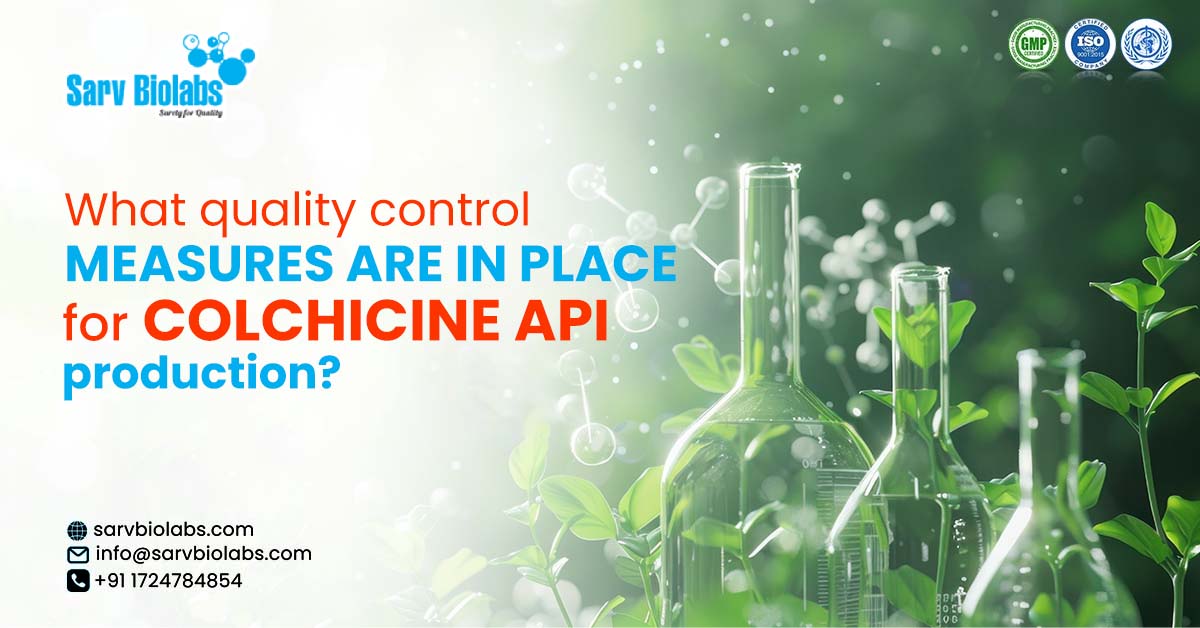
What Quality Control Measures are in Place for Colchicine API Production?
The global Active Pharmaceutical Ingredient (API) market is going to hit over USD 300 billion by 2025, and plant-based materials are going to be absolutely key to that. Colchicine, an alkaloid that comes from the plant Colchicum autumnale, is very popular because it can be used to treat gout and familial Mediterranean fever. There's a tremendous demand for it because chronic inflammatory diseases are surfacing everywhere. Because of that, Colchicine API manufacturing has to have extremely strict quality control to make sure it's pure, consistent, and safe for patients. They keep everything under close scrutiny, from raw material sourcing to releasing the final product, all in accordance with international guidelines. They use hip techniques like HPLC, mass spectrometry & microbial analysis to make sure they're following global guidelines. Companies adhere to standards such as WHO-GMP, USFDA, and European Pharmacopoeia.
Industry titans like Sarv Biolabs spend a great deal of money on technology, safety measures, and ensuring processes are consistent. Hence, good quality control doesn't merely tick boxes for regulation; it also ensures trust with customers all across the globe.
Purity Test: To verify the level of purity, chromatographic methods are required. That's how you can make the compound meet pharmacopoeia standards & remove any toxic contaminants.
Process Validation: Each stage of manufacturing, or step, has documented evidence to support it. The ability to synthesise Colchicine API in batches is guaranteed by process validation.
Stability Testing: They expose the API to stress stability and long-term testing. They guarantee the preservation of potency and safety throughout distribution and storage.
Microbial Testing: Microbiological limits are tightly controlled. Hence, the absence of harmful microorganisms satisfies global standards of safety.
Heavy Metal Screening: ICP-MS and related methods detect trace levels of lead, arsenic, and mercury. Toxic residue management is needed for therapeutic safety.
Batch Release Inspection: Before release, each batch is tested against pharmacopoeia standards. Quality control groups verify results before supplying authorization.
Additionally, with regulatory bodies strengthening rules, distributors have to deal with low-risk manufacturers who are compliance-oriented. Furthermore, digital tracking and blockchain technology are enhancing transparency. Hence, this ensures safe, timely, and verified delivery to global customers. Distributors, therefore, play an important role in expanding the reach of Colchicine API production, with quality APIs reaching every nook & corner of the globe.
Businesses can meet strict international standards and provide distributors with consistent products thanks to automation. Hence, with regulations becoming tighter, technology-based testing becomes essential to maintain a competitive advantage in the pharmaceutical market.
Further, the growing demand for colchicine in chronic disease treatment makes compliance with standards even more indispensable. Hence, non-compliance may result in export prohibition, product recall, or loss of credibility. Firms that invest in global compliance systems not only gain credibility but also establish distributor networks. For long-term development, compliance with the International Pharmacopoeia remains a necessity in this highly competitive API industry.
It ensures purity, consistency, patient safety & regulatory compliance, all of which are essential to pharmaceutical confidence and global supply.
Q2: What are the mandatory tests performed in Colchicine API production?
They include HPLC purity tests, stability tests, microbial tests, heavy metal tests & batch release tests.
Q3: How do Colchicine API distributors ensure product integrity?
They ensure that they buy from licensed manufacturers, follow strict storage protocols, and check documents for conformity before supplying to pharma companies.
Q4: What global markets drive demand for Colchicine API?
Major markets are Asia-Pacific, Europe, and Latin America, owing to the prevalence of gout and inflammatory diseases spreading all over the world.
Industry titans like Sarv Biolabs spend a great deal of money on technology, safety measures, and ensuring processes are consistent. Hence, good quality control doesn't merely tick boxes for regulation; it also ensures trust with customers all across the globe.
Significant Quality Control Operations in Colchicine API Manufacturing
Raw Material Authentication: Colchicine API manufacturing starts with the strict identification of colchicine plant material. Authentication guards against adulteration & offers raw material consistency for API recovery.Purity Test: To verify the level of purity, chromatographic methods are required. That's how you can make the compound meet pharmacopoeia standards & remove any toxic contaminants.
Process Validation: Each stage of manufacturing, or step, has documented evidence to support it. The ability to synthesise Colchicine API in batches is guaranteed by process validation.
Stability Testing: They expose the API to stress stability and long-term testing. They guarantee the preservation of potency and safety throughout distribution and storage.
Microbial Testing: Microbiological limits are tightly controlled. Hence, the absence of harmful microorganisms satisfies global standards of safety.
Heavy Metal Screening: ICP-MS and related methods detect trace levels of lead, arsenic, and mercury. Toxic residue management is needed for therapeutic safety.
Batch Release Inspection: Before release, each batch is tested against pharmacopoeia standards. Quality control groups verify results before supplying authorization.
Why Quality Control Is Important for Colchicine API Distributor Standards
- It is the responsibility of distributors to provide trust. By purchasing from trustworthy manufacturers, every Colchicine API distributor guarantees that end consumers receive effective and safe medicines.
- The USFDA, DCGI, and EMA regulations must be followed by APIs. Distributors rely on approved suppliers so that they are not recalled or penalized.
- Colchicine API distributors rely on tested processes provided by producers. Consistency avoids shortages and improves business relationships with pharma companies around the world.
- Quality control ensures market confidence. Slippage in distributor quality standards for Colchicine API can harm reputation and restrict future market potential.
- Exported APIs are subjected to some rigorous tests. Firm quality control measures allow distributors to export to over 100 countries.
- Hospitals, dealers, and franchisees favour distributors who have ties to approved producers. Such trust offers repeat business.
- In the world API market, being great at quality control is valuable. It builds trust & offers more profit in a competitive market.
Why Are Colchicine API Distributor Networks Growing Significantly?
The role of a Colchicine API distributor is not just about supply. Growing demand in the world makes distributors an important link between pharma firms & drug manufacturers. Distributors ensure APIs meet all regulatory, safety, and technical requirements prior to export to medicine manufacturers. Sophisticated tracking, quality packaging, and approved cold-chain facilities enhance distribution. Higher exports to Asia, Europe, and Latin America point to the necessity of robust distributor networks.Additionally, with regulatory bodies strengthening rules, distributors have to deal with low-risk manufacturers who are compliance-oriented. Furthermore, digital tracking and blockchain technology are enhancing transparency. Hence, this ensures safe, timely, and verified delivery to global customers. Distributors, therefore, play an important role in expanding the reach of Colchicine API production, with quality APIs reaching every nook & corner of the globe.
What is the Role of Technology in Testing Protocols?
Technology has revolutionised quality control in Colchicine API manufacturing. Advanced techniques such as High-Performance Liquid Chromatography (HPLC), Nuclear Magnetic Resonance (NMR) & Fourier-transform infrared spectroscopy (FTIR) ensure high precision in testing. These processes detect even minute traces of impurities, safeguarding patients. Automated real-time monitoring software detects deviations at the initial stage. Further, validated electronic systems check each manufacturing step for auditing conformity. Advanced laboratories utilize mass spectrometry to analyze molecules with precision. All these technologies integrate to offer a controlled environment with less risk.Businesses can meet strict international standards and provide distributors with consistent products thanks to automation. Hence, with regulations becoming tighter, technology-based testing becomes essential to maintain a competitive advantage in the pharmaceutical market.
Global Compliance and Market Expansion
The foundation of the quality systems in the production of Colchicine API is global regulatory compliance. Firms have to adhere to various regulations like the USFDA, EMA, and Indian DCGI standards. The company's adherence to quality and safety is validated by its ISO and WHO-GMP certifications. Additionally, companies are able to export APIs to more than 120 countries thanks to these clearances. Overseas buyers prefer to receive Certificates of Analysis (CoA), Material Safety Data Sheets (MSDS), and audited reports before making a purchase. Compliance provides access to the European, Latin American & Southeast Asian markets.Further, the growing demand for colchicine in chronic disease treatment makes compliance with standards even more indispensable. Hence, non-compliance may result in export prohibition, product recall, or loss of credibility. Firms that invest in global compliance systems not only gain credibility but also establish distributor networks. For long-term development, compliance with the International Pharmacopoeia remains a necessity in this highly competitive API industry.
Final Thoughts
Proper devotion to Colchicine API manufacturing is the foundation of compliance, safety, and business development. Hence, from raw material inspection to distributor networks, it takes every step in supplying consistent APIs. Multinational companies such as Sarv Biolabs are an example of how investment in technology and compliance ensures long-lasting distributor and pharmaceutical companies' relationships globally.In the growing pharmaceutical sector, strict quality management ensures trust, safety & long-term business transactions.Frequently Asked Questions
Q1: Why is quality control such a vital concern in Colchicine API manufacturing?It ensures purity, consistency, patient safety & regulatory compliance, all of which are essential to pharmaceutical confidence and global supply.
Q2: What are the mandatory tests performed in Colchicine API production?
They include HPLC purity tests, stability tests, microbial tests, heavy metal tests & batch release tests.
Q3: How do Colchicine API distributors ensure product integrity?
They ensure that they buy from licensed manufacturers, follow strict storage protocols, and check documents for conformity before supplying to pharma companies.
Q4: What global markets drive demand for Colchicine API?
Major markets are Asia-Pacific, Europe, and Latin America, owing to the prevalence of gout and inflammatory diseases spreading all over the world.
Contact Us
Recent Posts
+91 172-4784854
info@sarvbiolabs.com






